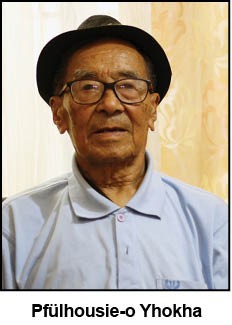
Nonagenarian Pfülhousie-o Yhokha from Kigwema village recalls his experience of being thrown in the midst of a raging world war
Morung Express News
Kohima | June 15
“The day I saw the war plane, I ran inside, frightened. That was the most terrifying moment I had ever encountered. We had never seen a plane in our lives. We were all so frightened when we saw it for the first time. We were too scared to even move,” recalls 96 years old Pfülhousie-o Yhokha on seeing a war plane in 1944 during the Second World War.
While there were heavy firings during the war, for Yhokha, the most frightening moment was seeing a plane. Like most Nagas who witnessed the Second World War, Pfülhousie-o did not understand why the war was fought.
Yhokha was around 21 years old when the war broke out. Like many villagers, he fled from his village Kigwema seeking refuge at Khonoma village along with his family.
“The people of Khonoma provided us food and shelter,” says Yhokha. While at Khonoma, Pfülhousie-o got the opportunity to work as a porter for the British at Zubza. “A young lad took me to Zubza one day and showed me where the British were stationed. By the next day, I started wandering on my own to Zubza.”
Pfülhousie-o also remembered how the British would give them canned foods, beef, pork, cigarettes and biscuits for free. These, he would take it to his family seeking refuge at Khonoma. “While providing the meat and biscuits to my family, I would sell the spare ones and save the money. At one point of time, me and my friend were able to save 30 rupees in a month,” recalls Yhokha.
Yhokha served both the Britishers and Japanese during the World War II viewed that while the former were affable, the latter were domineering.
“When the Japanese came to our village, they took our rice and killed our livestocks. The Japanese were intimidating and threatening. I used to carry their ration and whenever we brought them pigs, they would give us the head of the pig since they did not consume that part of the pig. But they were quite intimidating. I never conversed with them. We normally brought their ration quietly and left,” says Pfülhousie-o.
He observed that the British were more generous than the Japanese. “Since I didn't know their language we didn't communicate much. They would direct us through hand gestures and we would follow and work. They would just laugh and throw the cigarettes, biscuits and meat freely to us,” says Yhokha.
After the war ended, Yhokha and his family returned to their village Kigwema to find their home and granaries intact. However, the houses in the neighbouring villages such as Phesama and Mima were razed down. “Many from these villages took refuge in our village before they could resettle in their villages,” says Pfülhousie-o who also mentions that his family too provided shelter to two families from Mima village.
“We all slowly began rebuilding our lives and homes again,” says Yhokha who went on to become a successful mason.
At 96, Pfülhousie-o lives at Daklane colony, Kohima with his 85 years old wife Zemotsole.


